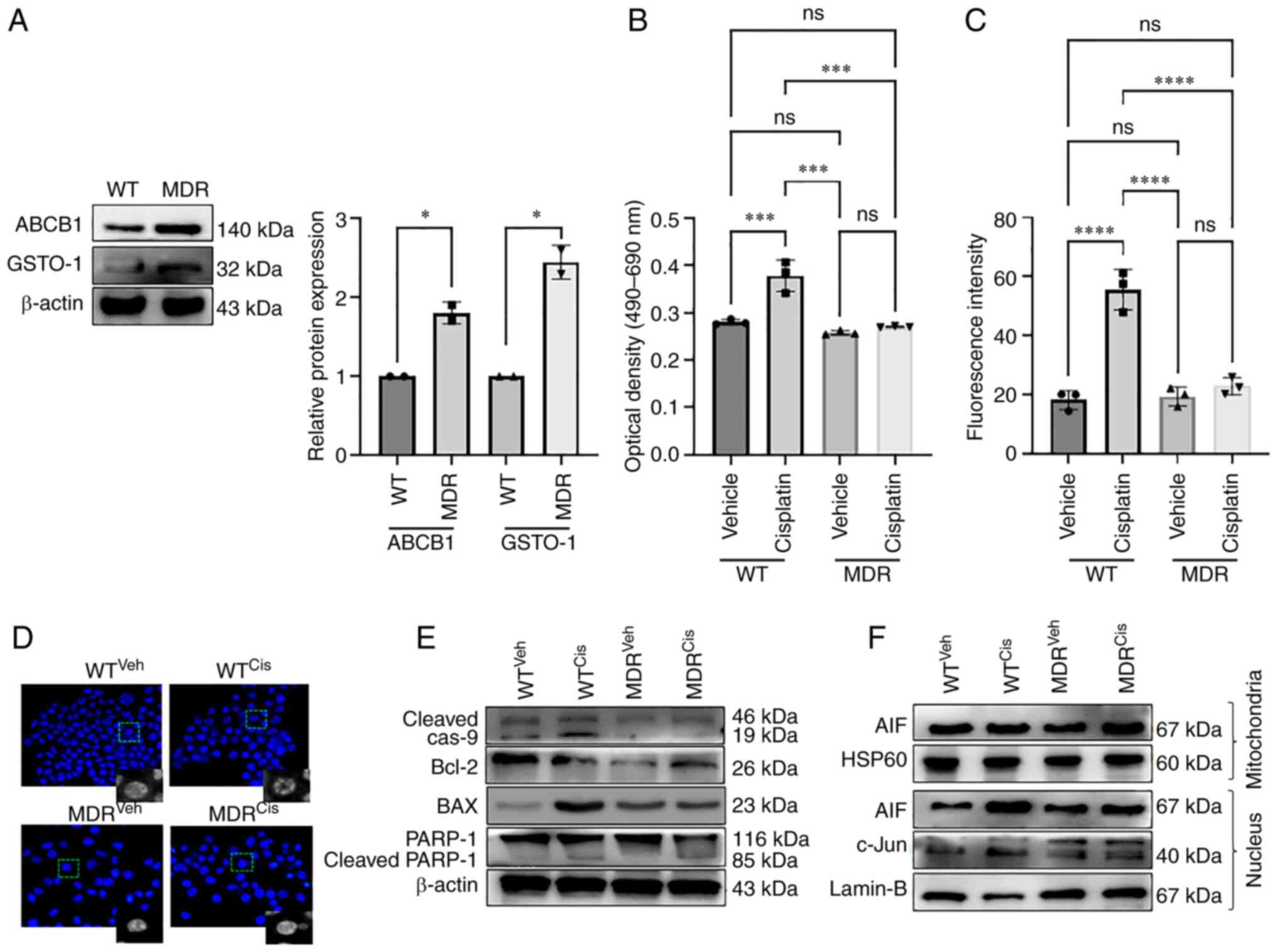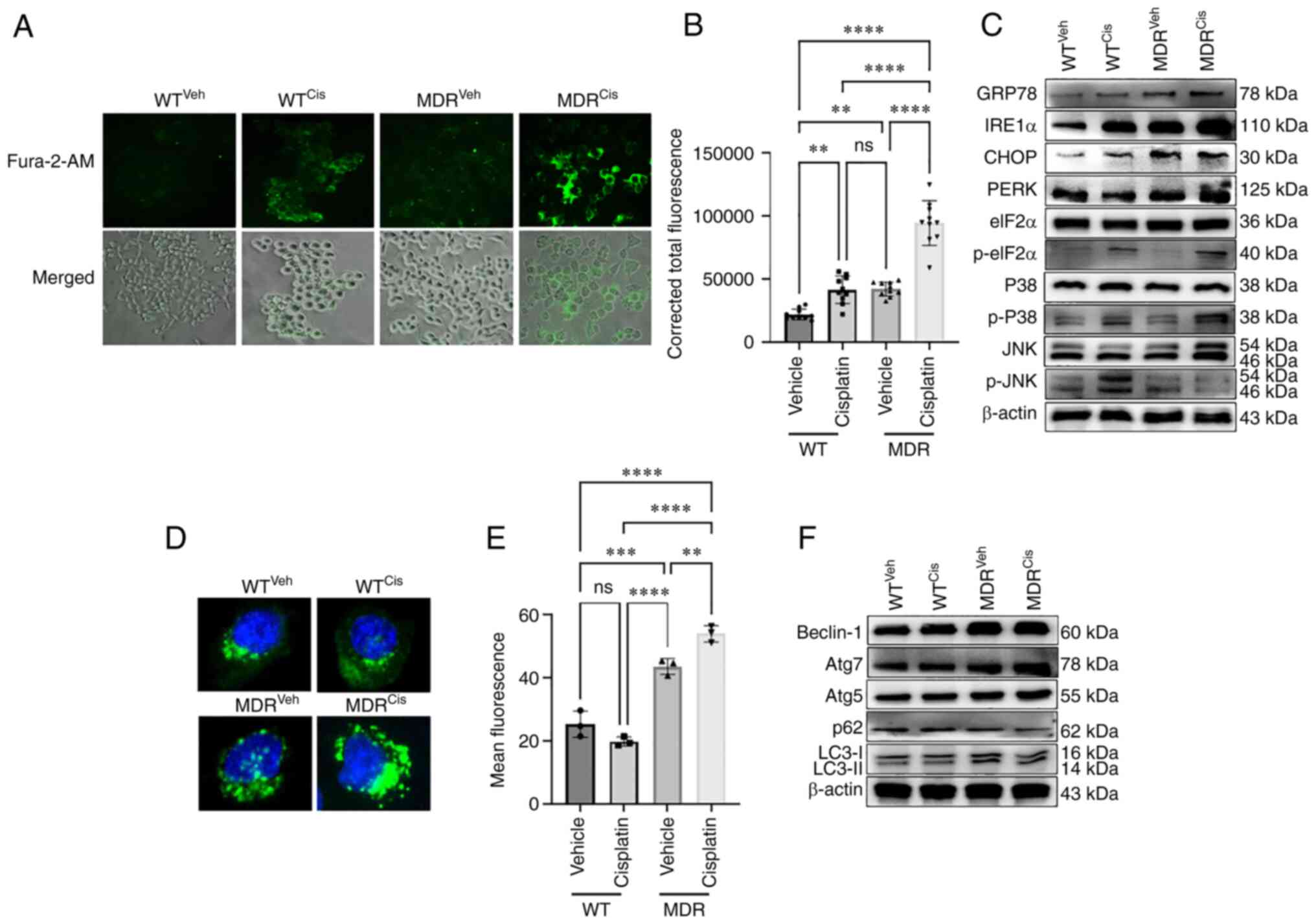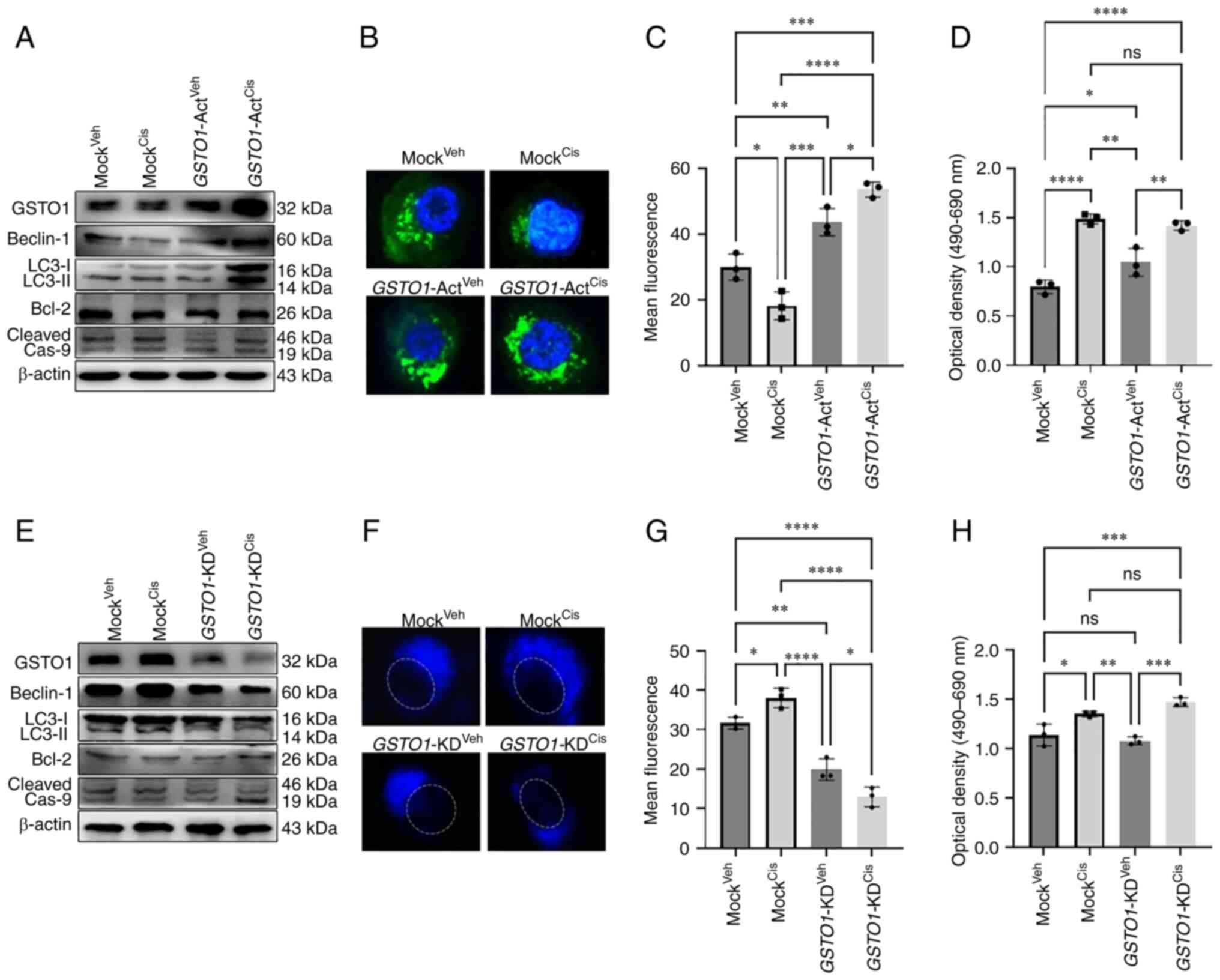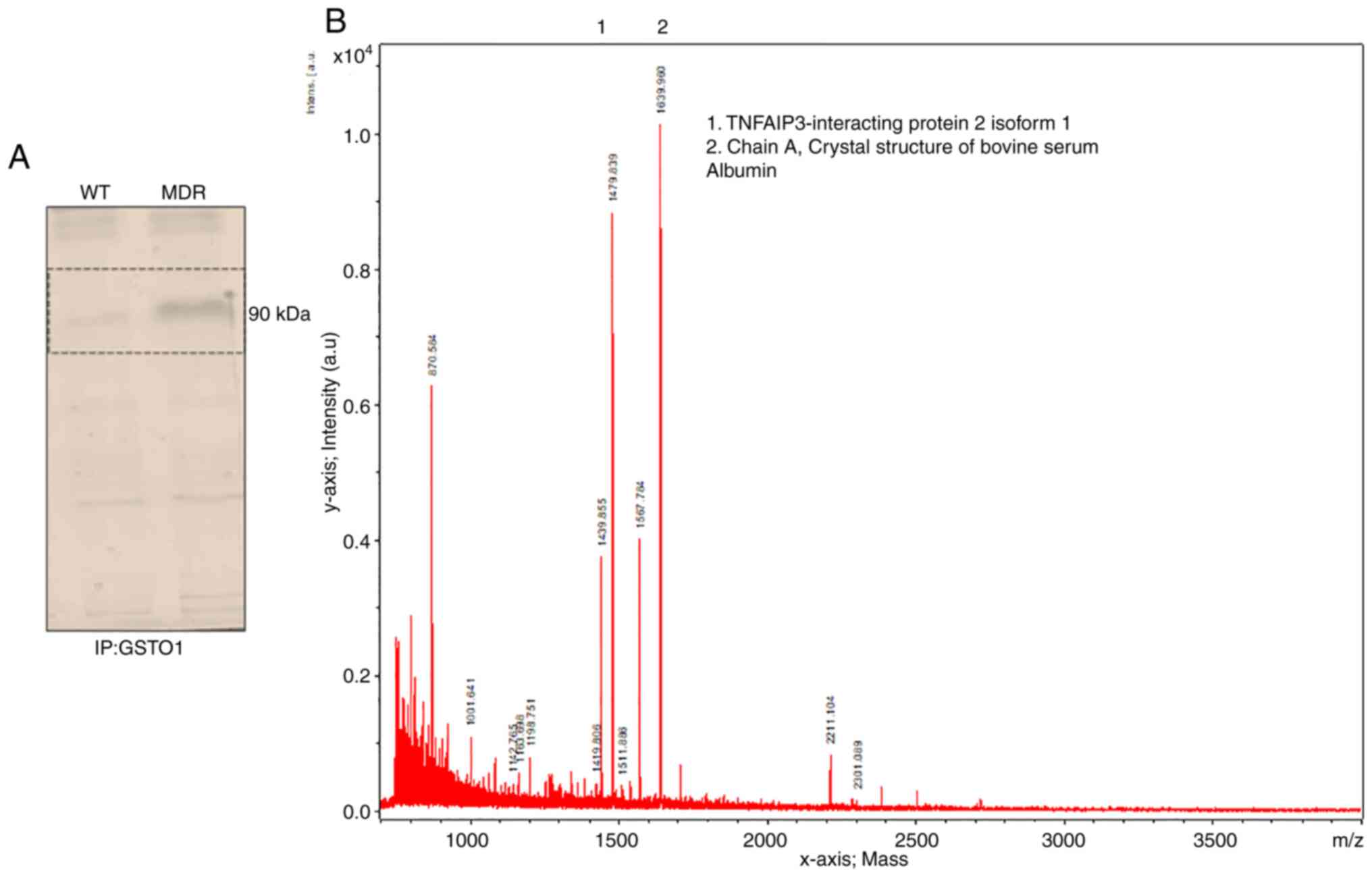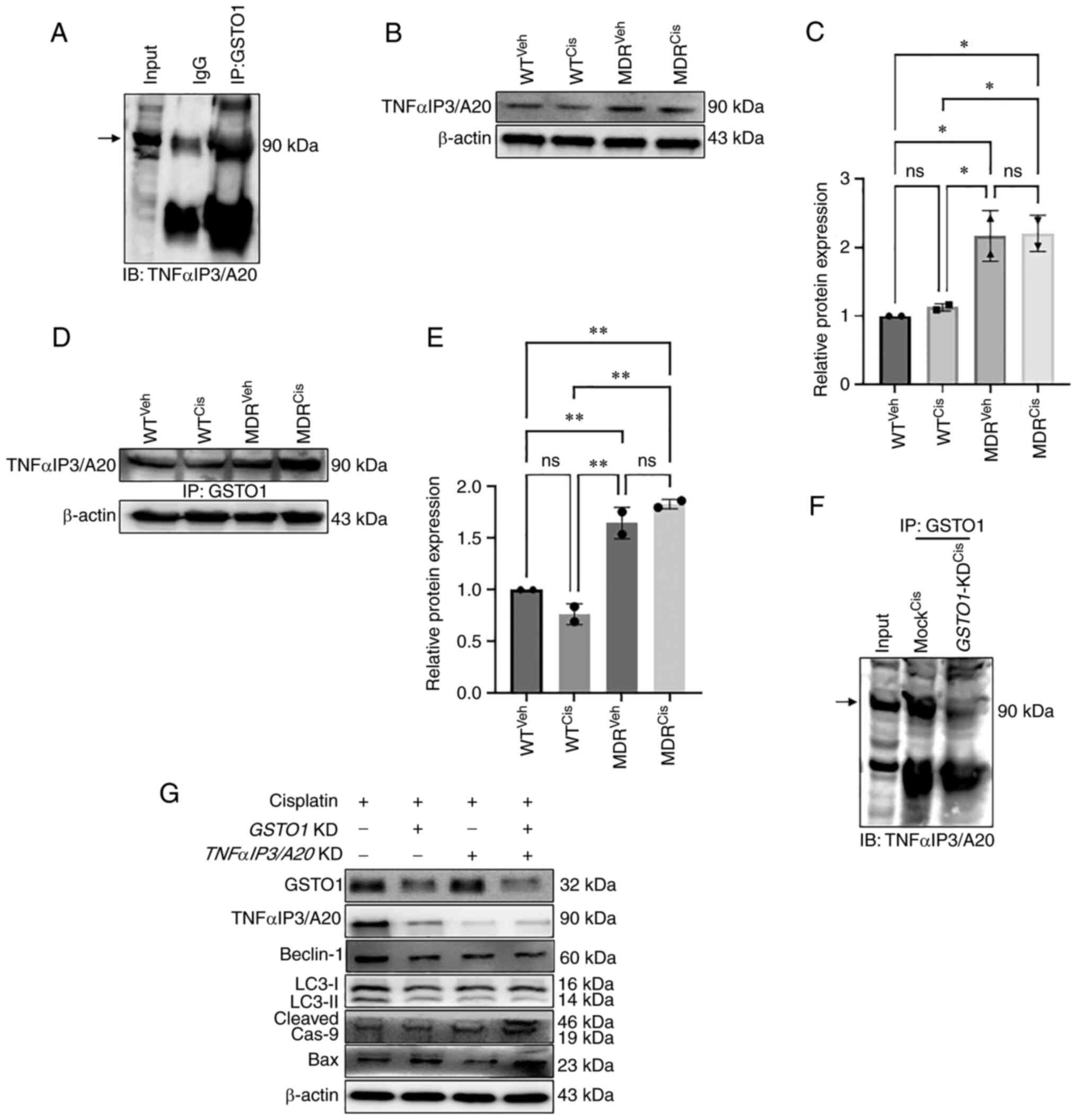|
1
|
Wang X, Zhang H and Chen X: Drug
resistance and combating drug resistance in cancer. Cancer Drug
Resist. 2:141–160. 2019.PubMed/NCBI
|
|
2
|
Bukowski K, Kciuk M and Kontek R:
Mechanisms of multidrug resistance in cancer chemotherapy1. Int J
Mol Sci. 21:32332020. View Article : Google Scholar
|
|
3
|
Köberle B and Schoch S: Platinum complexes
in colorectal cancer and other solid tumors. Cancers (Basel).
13:20732021. View Article : Google Scholar
|
|
4
|
Mele L, Del Vecchio V, Liccardo D, Prisco
C, Schwerdtfeger M, Robinson N, Desiderio V, Tirino V, Papaccio G
and La Noce M: The role of autophagy in resistance to targeted
therapies. Cancer Treat Rev. 88:1020432020. View Article : Google Scholar : PubMed/NCBI
|
|
5
|
Dang DT, Chen F, Kohli M, Rago C, Cummins
JM and Dang LH: Glutathione S-transferase pi1 promotes
tumorigenicity in HCT116 human colon cancer cells. Cancer Res.
65:9485–9494. 2005. View Article : Google Scholar : PubMed/NCBI
|
|
6
|
Ogino S, Konishi H, Ichikawa D, Matsubara
D, Shoda K, Arita T, Kosuga T, Komatsu S, Shiozaki A, Okamoto K, et
al: Glutathione S-transferase Pi 1 is a valuable predictor for
cancer drug resistance in esophageal squamous cell carcinoma.
Cancer Sci. 110:795–804. 2019. View Article : Google Scholar
|
|
7
|
Su F, Hu X, Jia W, Gong C, Song E and
Hamar P: Glutathion S transferase pi indicates chemotherapy
resistance in breast cancer. J Surg Res. 113:102–108. 2003.
View Article : Google Scholar : PubMed/NCBI
|
|
8
|
Board PG, Coggan M, Chelvanayagam G,
Easteal S, Jermiin LS, Schulte GK, Danley DE, Hoth LR, Griffor MC,
Kamath AV, et al: Identification, characterization, and crystal
structure of the omega class glutathione transferases. J Biol Chem.
275:24798–24806. 2000. View Article : Google Scholar : PubMed/NCBI
|
|
9
|
Paul S, Jakhar R, Bha rdwaj M and Kang SC:
Glutathione-S-transferase omega 1 (GSTO11) acts as mediator of
signaling pathways involved in aflatoxin B1-induced
apoptosis-autophagy crosstalk in macrophages. Free Radic Biol Med.
89:1218–1230. 2015. View Article : Google Scholar : PubMed/NCBI
|
|
10
|
Lu H, Chen I, Shimoda LA, Park Y, Zhang C,
Tran L, Zhang H and Semenza GL: Erratum: Chemotherapy-induced
Ca2+ release stimulates breast cancer stem cell
enrichment. Cell Rep. 18:1946–1957. 2017. View Article : Google Scholar : PubMed/NCBI
|
|
11
|
Yan XD, Pan LY, Yuan Y, Lang JH and Mao N:
Identification of platinum-resistance associated proteins through
proteomic analysis of human ovarian cancer cells and their
platinum-resistant sublines. J Proteome Res. 6:772–780. 2007.
View Article : Google Scholar : PubMed/NCBI
|
|
12
|
De Boussac H, Kassambara A, Machura A,
Chemlal D, Gourzones C, Requirand G, Robert N, Vincent L, Herbaux
C, Bruyer A and Moreaux J: Genomic characterization of in vitro
acquired-resistance to proteasome inhibitors. Blood. 138(Suppl 1):
S26512021. View Article : Google Scholar
|
|
13
|
Mowers EE, Sharifi MN and Macleod KF:
Autophagy in cancer metastasis. Oncogene. 36:1619–1630. 2017.
View Article : Google Scholar :
|
|
14
|
Cao W, Wei W, Zhan Z, Xie D, Xie Y and
Xiao Q: Regulation of drug resistance and metastasis of gastric
cancer cells via the microRNA647-ANK2 axis. Int J Mol Med.
41:1958–1966. 2018.PubMed/NCBI
|
|
15
|
Malek E, Jagannathan S and Driscoll JJ:
Correlation of long non-coding RNA expression with metastasis, drug
resistance and clinical outcome in cancer. Oncotarget. 5:8027–8038.
2014. View Article : Google Scholar : PubMed/NCBI
|
|
16
|
Bhardwaj M, Cho HJ, Paul S, Jakhar R, Khan
I, Lee SJ, Kim BY, Krishnan M, Khaket TP, Lee HG and Kang SC:
Vitexin induces apoptosis by suppressing autophagy in multi-drug
resistant colorectal cancer cells. Oncotarget. 9:3278–3291. 2017.
View Article : Google Scholar
|
|
17
|
Wang J, Seebacher N, Shi H, Kan Q and Duan
Z: Novel strategies to prevent the development of multidrug
resistance (MDR) in cancer. Oncotarget. 8:84559–84571. 2017.
View Article : Google Scholar : PubMed/NCBI
|
|
18
|
Galluzzi L, Senovilla L, Vitale I, Michels
J, Martins I, Kepp O, Castedo M and Kroemer G: Molecular mechanisms
of cisplatin resistance. Novel strategies to prevent the
development of multidrug resistance (MDR) in cancer. Oncogene.
31:1869–1883. 2012. View Article : Google Scholar
|
|
19
|
Siddik ZH: Cisplatin: Mode of cytotoxic
action and molecular basis of resistance. Oncogene. 22:7265–7279.
2003. View Article : Google Scholar : PubMed/NCBI
|
|
20
|
Florea AM and Büsselberg D: Cisplatin as
an anti-tumor drug: Cellular mechanisms of activity, drug
resistance and induced side effects. Cancers (Basel). 3:1351–1371.
2011. View Article : Google Scholar
|
|
21
|
Chen Y, Zhang W, Guo X, Ren J and Gao A:
The crosstalk between autophagy and apoptosis was mediated by
phosphorylation of Bcl-2 and beclin1 in benzene-induced
hematotoxicity. Cell Death Dis. 10:7722019. View Article : Google Scholar : PubMed/NCBI
|
|
22
|
Daugas E, Susin SA, Zamzami N, Ferri KF,
Irinopoulou T, Larochette N, Prévost MC, Leber B, Andrews D,
Penninger J and Kroemer G: Mitochondrio-nuclear translocation of
AIF in apoptosis and necrosis. FASEB J. 14:729–739. 2000.
View Article : Google Scholar : PubMed/NCBI
|
|
23
|
Koo MS, Kwon YG, Park JH, Choi WJ, Billiar
TR and Kim YM: Signaling and function of caspase and c-Jun
N-terminal kinase in cisplatin-induced apoptosis. Mol Cells.
13:194–201. 2002.PubMed/NCBI
|
|
24
|
Lin Y, Jiang M, Chen W, Zhao T and Wei Y:
Cancer and ER stress: Mutual crosstalk between autophagy, oxidative
stress and inflammatory response. Biomed Pharmacother.
118:1092492019. View Article : Google Scholar : PubMed/NCBI
|
|
25
|
Bertero E and Maack C: Calcium signaling
and reactive oxygen species in mitochondria. Circ Res.
122:1460–1478. 2018. View Article : Google Scholar : PubMed/NCBI
|
|
26
|
Sukumaran P, Nascimento Da Conceicao V,
Sun Y, Ahamad N, Saraiva LR, Selvaraj S and Singh BB: Calcium
signaling regulates autophagy and apoptosis. Cells. 10:21252021.
View Article : Google Scholar : PubMed/NCBI
|
|
27
|
Bertero E and Maack C: Calcium signaling
and reactive oxygen species in mitochondria. Circ Res.
122:1460–1478. 2018. View Article : Google Scholar : PubMed/NCBI
|
|
28
|
Carreras-Sureda A, Pihán P and Hetz C:
Calcium signaling at the endoplasmic reticulum: Fine-tuning stress
responses. Cell Calcium. 70:2018. View Article : Google Scholar
|
|
29
|
Huang R, Hui Z, Wei S, Li D, Li W, Daping
W and Alahdal M: IRE1 signaling regulates chondrocyte apoptosis and
death fate in the osteoarthritis. J Cell Physiol. 237:118–127.
2022. View Article : Google Scholar :
|
|
30
|
Hu H, Tian M, Ding C and Yu S: The C/EBP
homologous protein (CHOP) transcription factor functions in
endoplasmic reticulum stress-induced apoptosis and microbial
infection. Front Immunol. 9:30832019. View Article : Google Scholar : PubMed/NCBI
|
|
31
|
Jiang Q, Li F, Shi K, Wu P, An J, Yang Y
and Xu C: Involvement of p38 in signal switching from autophagy to
apoptosis via the PERK/eIF2α/ATF4 axis in selenite-treated NB4
cells. Cell Death Dis. 5:e12702014. View Article : Google Scholar
|
|
32
|
Lumley EC, Osborn AR, Scott JE, Scholl AG,
Mercado V, McMahan YT, Coffman ZG and Brewster JL: Moderate
endoplasmic reticulum stress activates a PERK and p38-dependent
apoptosis. Cell Stress Chaperones. 22:43–54. 2017. View Article : Google Scholar :
|
|
33
|
Xu Y, Sun Q, Yuan F, Dong H, Zhang H, Geng
R, Qi Y, Xiong X, Chen Q and Liu B: RND2 attenuates apoptosis and
autophagy in glioblastoma cells by targeting the p38 MAPK
signalling pathway. J Exp Clin Cancer Res. 39:1742020. View Article : Google Scholar : PubMed/NCBI
|
|
34
|
Koromilas AE: M(en)TORship lessons on life
and death by the integrated stress response. Biochim Biophys Acta
Gen Subj. 1863:644–649. 2019. View Article : Google Scholar
|
|
35
|
Pljesa-Ercegovac M, Savic-Radojevic A,
Matic M, Coric V, Djukic T, Radic T and Simic T: Glutathione
transferases: Potential targets to overcome chemoresistance in
solid tumors. Int J Mol Sci. 19:37852018. View Article : Google Scholar
|
|
36
|
Guo C, Fordjour FK, Tsai SJ, Morrell JC
and Gould SJ: Choice of selectable marker affects recombinant
protein expression in cells and exosomes. J Biol Chem.
297:1008382021. View Article : Google Scholar : PubMed/NCBI
|
|
37
|
Jiang W, Yan Y, Chen M, Luo G, Hao J, Pan
J, Hu S, Guo P, Li W, Wang R, et al: Aspirin enhances the
sensitivity of colon cancer cells to cisplatin by abrogating the
binding of NF-κB to the COX-2 promoter. Aging (Albany NY).
12:611–627. 2020. View Article : Google Scholar
|
|
38
|
Kleih M, Böpple K, Dong M, Gaißler A,
Heine S, Olayioye MA, Aulitzky WE and Essmann F: Direct impact of
cisplatin on mitochondria induces ROS production that dictates cell
fate of ovarian cancer cells. Cell Death Dis. 10:8512019.
View Article : Google Scholar : PubMed/NCBI
|
|
39
|
Zhang W, Wang Z, Cai G and Huang P:
Downregulation of circ_0071589 suppresses cisplatin resistance in
colorectal cancer by regulating the MiR-526b-3p/KLF12 axis. Cancer
Manag Res. 13:2717–2731. 2021. View Article : Google Scholar : PubMed/NCBI
|
|
40
|
Sun M, He L, Fan Z, Tang R and Du J:
Effective treatment of drug-resistant lung cancer via a nanogel
capable of reactivating cisplatin and enhancing early apoptosis.
Biomaterials. 257:1202522020. View Article : Google Scholar : PubMed/NCBI
|
|
41
|
Sun X, Wang S, Gai J, Guan J, Li J, Li Y,
Zhao J, Zhao C, Fu L and Li Q: SIRT5 promotes cisplatin resistance
in ovarian cancer by suppressing DNA damage in a ROS-dependent
manner via regulation of the Nrf2/HO-1 pathway. Front Oncol.
9:7542019. View Article : Google Scholar : PubMed/NCBI
|
|
42
|
Zhang YK, Wang YJ, Lei ZN, Zhang GN, Zhang
XY, Wang DS, Al Rihani SB, Shukla S, Ambudkar SV, Kaddoumi A, et
al: Regorafenib antagonizes BCRP-mediated multidrug resistance in
colon cancer. Cancer Lett. 442:104–112. 2019. View Article : Google Scholar
|
|
43
|
Uozaki H, Horiuchi H, Ishida T, Iijima T,
Imamura T and Machinami R: Overexpression of resistance-related
proteins (metallothioneins, glutathione-S-transferase pi, heat
shock protein 27, and lung resistance-related protein) in
osteosarcoma: Relationship with poor prognosis. Cancer.
79:2336–2344. 1997. View Article : Google Scholar : PubMed/NCBI
|
|
44
|
Singh RR and Reindl KM: Glutathione
S-transferases in cancer. Antioxidants (Basel). 10:7012021.
View Article : Google Scholar
|
|
45
|
Guo Y, Chang C, Huang R, Liu B, Bao L and
Liu W: AP1 is essential for generation of autophagosomes from the
trans-Golgi network. J Cell Sci. 125:1706–1715. 2012.PubMed/NCBI
|
|
46
|
Chen P, Liu XQ, Lin X, Gao LY, Zhang S and
Huang X: Targeting YTHDF1 effectively re-sensitizes
cisplatin-resistant colon cancer cells by modulating GLS-mediated
glutamine metabolism. Mol Ther Oncolytics. 20:228–239. 2021.
View Article : Google Scholar : PubMed/NCBI
|
|
47
|
Dong X, Yang Y, Zhou Y, Bi X, Zhao N,
Zhang Z, Li L, Hang Q, Zhang R, Chen D, et al: Glutathione
S-transferases P1 protects breast cancer cell from
adriamycin-induced cell death through promoting autophagy. Cell
Death Differ. 26:2086–2099. 2019. View Article : Google Scholar : PubMed/NCBI
|
|
48
|
Abbasi A, Forsberg K and Bischof F: The
role of the ubiquitin-editing enzyme A20 in diseases of the central
nervous system and other pathological processes. Front Mol
Neurosci. 8:212015. View Article : Google Scholar : PubMed/NCBI
|
|
49
|
Das T, Chen Z, Hendriks RW and Kool M:
A20/tumor necrosis factor α-induced protein 3 in immune cells
controls development of autoinflammation and autoimmunity: Lessons
from mouse models. Front Immunol. 9:1042018. View Article : Google Scholar
|
|
50
|
Yang C, Zang W, Tang Z, Ji Y, Xu R, Yang
Y, Luo A, Hu B, Zhang Z, Liu Z and Zheng X: A20/TNFAIP3 regulates
the DNA damage response and mediates tumor cell resistance to
DNA-damaging therapy. Cancer Res. 78:1069–1082. 2018. View Article : Google Scholar
|
|
51
|
Vendrell JA, Ghayad S, Ben-Larbi S,
Dumontet C, Mechti N and Cohen PA: A20/TNFAIP3, a new
estrogen-regulated gene that confers tamoxifen resistance in breast
cancer cells. Oncogene. 26:4656–4667. 2007. View Article : Google Scholar : PubMed/NCBI
|
|
52
|
Matsuzawa Y, Oshima S, Takahara M,
Maeyashiki C, Nemoto Y, Kobayashi M, Nibe Y, Nozaki K, Nagaishi T,
Okamoto R, et al: TNFAIP3 promotes survival of CD4 T cells by
restricting MTOR and promoting autophagy. Autophagy. 11:1052–1062.
2015. View Article : Google Scholar : PubMed/NCBI
|















